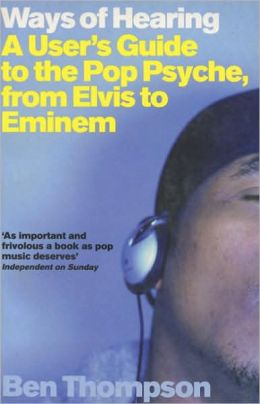Our book choice for November 2005 is Ways Of Hearing: A User’s Guide To The Pop Psyche from Elvis to Eminem by Ben Thompson. Someone once said that “pop music is an argument anyone can join in on.”
This book is a wide-ranging and thought-provoking exploration of the role of pop music in our culture. Thompson argues that pop music is not simply entertainment, but a powerful force that shapes our identity, our values, and our sense of the world.
The book is divided into three parts. The first part, “The Pop Psyche,” examines the ways in which pop music taps into our deepest emotions and desires. Thompson discusses the relationship between pop music and sexuality, violence, and spirituality. He also explores the ways in which pop music can be used to express our individuality, our sense of community, and our political beliefs.
The second part of the book, “The Pop Canon,” traces the history of pop music from its roots in the blues and gospel to the present day. Thompson discusses the work of some of the most important figures in pop music, including Elvis Presley, The Beatles, Bob Dylan, and Eminem. He also explores the ways in which pop music has been influenced by other cultures, such as African American culture and electronic dance music.
The third part of the book, “The Pop Future,” looks at the future of pop music. Thompson discusses the impact of digital technology on the music industry, and he speculates about what the future holds for pop music. He also offers some advice to aspiring musicians.
Some of the key themes that Thompson explores in the book include:
- The power of pop music to tap into our emotions and desires.
- The relationship between pop music and identity.
- The ways in which pop music can be used to express our individuality and our sense of community.
- The impact of digital technology on the music industry.
- The future of pop music.
Thompson also discusses the role of the media in shaping our understanding of pop music. He argues that the media plays a powerful role in determining which artists are successful, and in shaping the way we think about pop music. He discusses how the rise of MTV in the 1980s changed the way we consume pop music, and how the internet has made it possible for new artists to reach a wider audience than ever before.
Discussion Questions
- Thompson argues that “pop music is an argument anyone can join in on.” What do you think he means by this? Do you agree?
- Thompson discusses the role of music in the mediums of radio, TV, film, literature, and video. How do you think these mediums have shaped the way we experience music?
- Thompson interviews a wide range of musicians and DJs in the book. Who were your favorite interviewees? What did you learn from them?
- Thompson writes about the importance of context in understanding music. How does context shape our interpretation of music?
- Thompson discusses the relationship between music and identity. How does music help us to define ourselves?
- Thompson explores the power of music to both challenge and conform to social norms. What are some examples of this in the book?
- Thompson argues that music can be a powerful force for change. Do you agree? What are some examples of this?
- Thompson’s book was published in 2001. How has the landscape of pop music changed since then?
- What are some of your favorite pop songs? What do they mean to you?
- What are some of the ways that music has shaped your life?
- To whom would you recommend the book? Why or why not?

